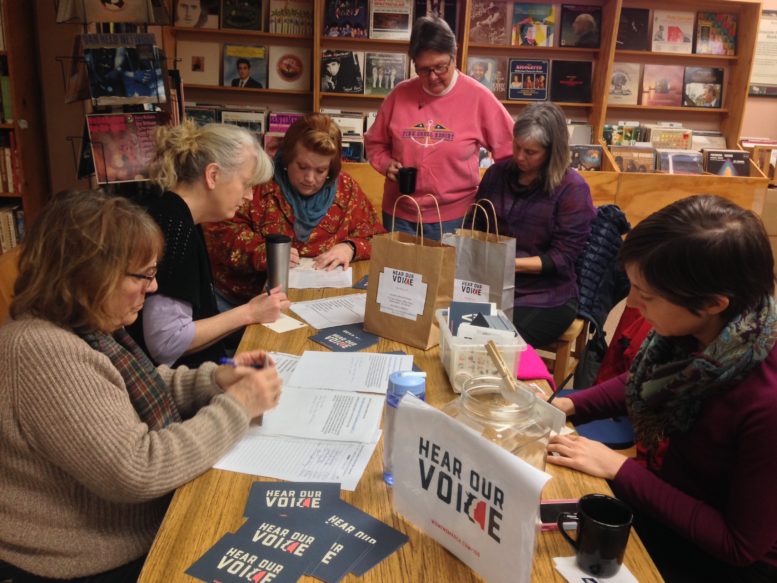By DAVID DUPONT
BG Independent News
Millions marched last Saturday across the nation last Saturday, their signs and hand-knit pink headwear sending a message that women will not be silent.
Now back home from marching in Washington D.C., Ann Arbor or Toledo, local participants and their supporters are ready to take the next step.
Thursday Kathy Pereira de Almeida set up shop at Grounds for Thought in downtown Bowling Green armed with 1,000 postcards and the addresses of U.S. Rep. Bob Latta (R-Bowling Green), U.S. Sen. Sherrod Brown (D-Ohio) and U.S. Sen. Rob Portman (R-Ohio).
The organizers of the Women’s March have called for people unhappy with direction the Trump Administration is moving the government to take 10 actions in the first 100 days of his administration. This is the first. She doesn’t know what the next will be.
She’ll be at Grounds all day Friday as late as she needs to be to get as many postcards mailed as possible.
Pereira de Almeida said she’s has not been an activist in the past, but “we can’t remain silent anymore.” She’s contacted all three congressional representatives at least twice. “It’s little steps that will have bigger impacts,” she said. “I’m doing it because I’m thinking about my daughters’ future.”
Pereira de Almeida’s daughters joined her marching in Ann Arbor, wearing the pink “pussy hats” that have become the iconic symbol of the movement. “They are a nice way of letting our thoughts get out that we’re not happy with the language our new president is using.”
On returning after the march she heard from other women who had participated. They wanted to keep the energy going and form a local group.
Pereira de Almeida volunteered, and they set up a secret Facebook group – the intent is to keep the trolls at bay – and within a day had 700 members, and now has 1,000.
“There’s a voice out there that wants to be heard and wants to hold our new administration accountable,” she said.
On the cards, the senders are letting their elected representatives know just what their concerns are.
For Pereira de Almeida her chief concern is preserving the Affordable Care Act. As a cancer survivor, she has a pre-existing condition, so without the protections afforded by the ACA, she faces the threat of not being able to get health insurance.
Her family did go through a year of not having insurance after they spent a year abroad tending to her father-in-law who was dying. When they returned home, no insurance company, for no amount of money, would cover them. At another point one of her daughters was kicked off the family’s insurance plan because of a medical condition.
Later under the ACA, they were able to keep their daughters on the family plan until they were 26. That “helped them get their careers started.”
ACA “is too costly,” she said. “It needs to be fixed” not totally disbanded.
Her oncologist told her, he fears a return to the days when he’d have to be on the telephone “begging” insurance companies to allow a patient to have surgery.
Meghan Wilson has been part of Indivisible District 5 going to offices of representatives to plead their case. This week they traveled to Findlay to talk to Portman’s staff. Her concern was the speed at which the ACA repeal is proceeding without a substitute in place. Portman’s staff tried to reassure her that the senator was doing his best to make the process more deliberative, and had offered an amendment to slow the process down.
But that amendment, Wilson said, was on a budget resolution that was voted down.
Still the senator said he’s amenable to preserving some popular parts of the bill and opposed Speaker of the House Paul Ryan’s plan to privatize Medicare and Medicaid.
The group is also pushing to meet face-to-face with Latta.
Beyond that, though, Wilson hopes the movement can maintain its momentum into the next election cycle and support Brown and find like-minded candidates to run for office.
Sandy Wicks, a founder of Grounds for Thought that is now owned by her son and daughter-in-law, said she was pleased the shop can play a role as the de facto headquarters for the movement.
She feels the march and now the 10 actions in the first 100 days project are “helping keep people aware.”
She’s concerned people “not normalize the president and his behavior.”
“What’s happening now is not good,” she said, “illogical, nonsensical stuff coming out of the White House. We have to be aware of it.
“We’re normalizing the president and his behavior,” she said “I never want to forget some of the comments he made over the course of the campaign. They are not normal things to say. As soon as people pretend they didn’t happen, I become I concerned. I think this march and this movement will help remind people of who he is and what he stands for.”
Ann Beck said her main concern is the environment, deregulation of greenhouse gases and the fate of national parks. Her husband, Kurt Panter, is a geologist, who does research on Antarctica related to global warming, and is part of the consensus of scientists who study the issue who assert the climate is getting warmer and human activity is the cause of that change. “He’s seen it first hand,” Beck said.
The march helped mobilize people like herself. “I’m not an activist or a hell raiser, but enough is enough,” Beck said.
She praised Pereira de Almeida for taking the initiative to get the group going. Activists urge others to take action, Beck said, but what action should they take?
This gives them a direction, she said.
Having hand-written messages on the cards are important, Pereira de Almeida said. “It gives them more impact. I hope the representatives get them and take them to heart.”





